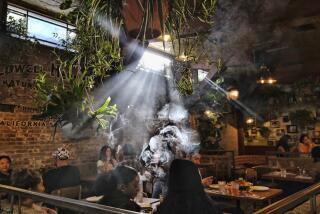After Tobacco Battles, a New Target: Guns
- Share via
Tobacco is a dirty habit. It’s safe to say so now. America, built in colonial days from tobacco profits, used to smile on the smoker. But in a single generation, centuries of deference gave way to a new intolerance, a healthy intolerance, as every smoker knows.
My boss knows. She came of age when Virginia Slims marketed the cigarette as a symbol of liberation. Today, however, she is forbidden to light up in the newsroom, or even in her office. She and her fellow nicotine fiends have to take their coffin nails outside. It’s the law--an excellent law.
It’s the law because nonsmokers finally asserted their rights. And in Los Angeles, nobody did more to put smokers in their place than city Councilman Marvin Braude, who has waged a 20-year crusade against tobacco.
Now Braude is taking on another public health issue: guns.
*
To be more precise, Braude is going after bullets--but then a gun without a bullet is like a cigarette without tobacco. Braude, who represents much of the Westside and the southern portion of the West Valley, wants to make ammunition dealers more accountable by requiring them to keep records of the identity of their buyers and the particulars of the purchase. The ordinance, which mirrors the law adopted Monday by the Pasadena City Council, is scheduled to come before the full council on March 22.
“And my expectation,” Braude says, “is that it would pass.”
Braude, 74, is a vote counter from way back. Now in his 30th year on the council, Braude has often been a few steps ahead of public sentiment, promoting environmental protection and slow-growth development before the causes became popular. Nothing illustrates this better than his crusade for nonsmokers’ rights.
When Braude joined the council, L.A.’s only tobacco ordinance prohibited smoking on city buses. Braude, who had long before kicked his own two-pack-a-day habit, launched his legislative assault in 1975. His first target was modest: elevators.
At R.J. Reynolds and Philip Morris, there must have been some giggling over the elevator law. The industry didn’t put up any resistance. But Braude had, in a small way, promoted the notion that the interests of nonsmokers should prevail over smokers in enclosed public places.
During the next 18 years, Braude would push through laws that either prohibited or sharply restricted smoking in grocery stores, medical facilities, the workplace, museums, indoor sports arenas and other public places. The only retail stores where there is no restriction are smoke shops. In ‘87, Braude pushed through the ordinance requiring restaurants with more than 50 seats to reserve 50% as nonsmoking sections. In ‘93, he got the votes to make L.A. restaurants smoke-free.
As the dominoes started to fall, the tobacco industry mounted stiff resistance, claiming that such laws trespass on individual rights. Restaurateurs fretted that diners would flee to other cities. But by then, Braude points out, the nonsmokers, who had once been so passive, had put tobacco users on the defensive. “Nonsmokers,” Braude says, “came out of the closet.”
Laws don’t just reflect social attitudes, they influence social movements. Voters in Redondo Beach on Tuesday rejected an advisory measure that would seek to liberalize state laws concerning concealed weapons permits. That vote buttresses the bullet ordinance that may soon sweep beyond Pasadena and Los Angeles. Braude is hopeful that laws would motivate the gun industry to act more responsibly.
“It alerts the sellers that society thinks this is a serious matter,” he explains. “It makes it more difficult for minors to get ammunition, and more difficult for felons.”
Police detectives say that such ammo records could help them solve crimes. And we all want cops to solve crimes, don’t we?
*
Responsible gun owners, as opposed to gun nuts, have no reason to worry about this law. Still, the bullet ordinance isn’t another elevator law. There will be a fight.
The parallels are striking. Both the tobacco industry and the firearms industry are powerful political entities that promote personal freedom as they deal in lethal products. A crucial difference, as gun advocates may point out, is that a homeowner couldn’t defend himself with a cigarette.
True, but there is more to ponder. Tobacco usually works slowly--though this week researchers announced the discovery of a link between secondhand smoke and sudden infant death syndrome. Most of tobacco’s victims, however, are mature and pretty much have themselves to blame. Bullets usually work fast and the victims are often young and innocent--increasingly so--such as those four teen-agers whose slayings on Halloween in 1993 inspired the Pasadena law, or the two 14-year-old girls in Victorville who recently committed suicide with handguns.
And we all want to protect the young and innocent, don’t we?
More to Read
Sign up for Essential California
The most important California stories and recommendations in your inbox every morning.
You may occasionally receive promotional content from the Los Angeles Times.













